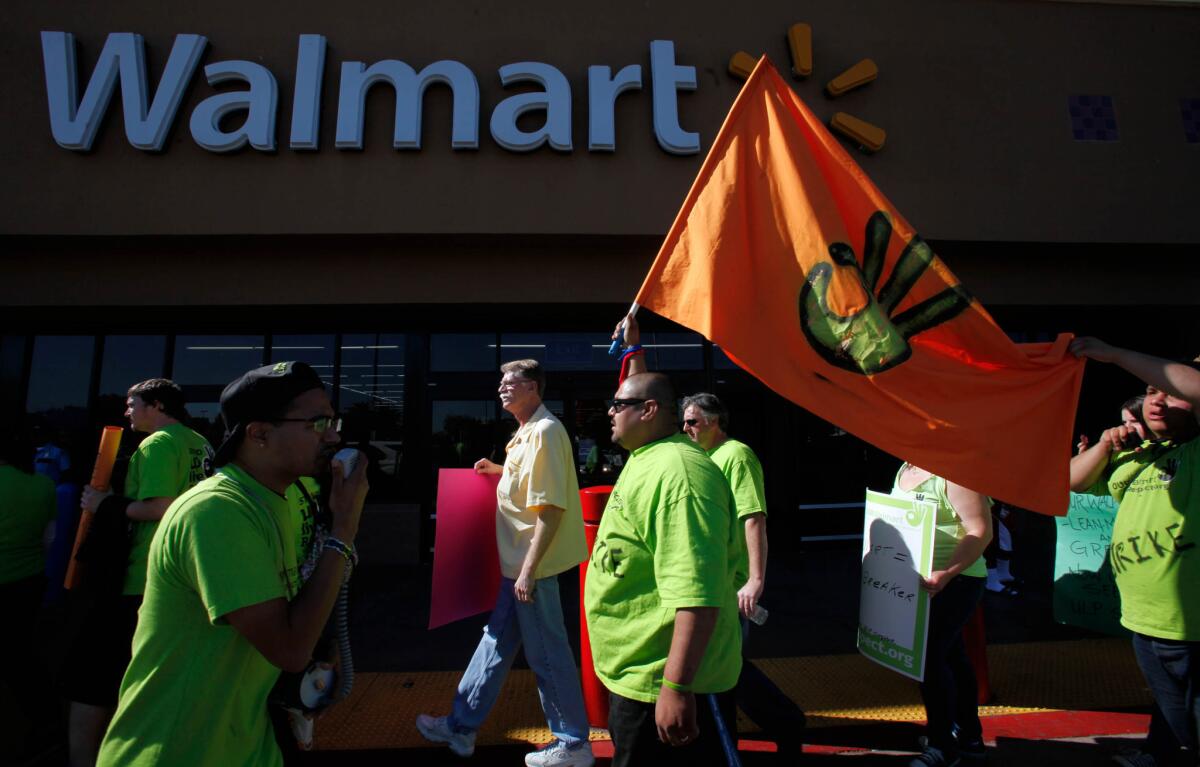Fully staffed NLRB investigates complaints against Wal-Mart

It may be some companiesâ worst nightmare: the National Labor Relations Board, which is fully functioning with all its members for the first time since August 2003, is beginning to investigate labor practices and big companies, and so far, has sided with labor.
The NLRBâs general counsel said Monday that it had investigated charges against Wal-Mart regarding employee protests last year in 13 states including California. It found that the retailer unlawfully threatened employees with reprisal if they engaged in strikes on Black Friday, unlawfully disciplined workers who did in engage in those strikes and unlawfully treated employees in other stores in anticipation of them participating in strikes or other labor activities.
The Black Friday protests last year spread to 100 cities, with 600 people turning out to a Wal-Mart in Paramount, Calif., to support workers.
The NLRB found in favor of Wal-Mart in two instances, saying that Wal-Mart did lawfully tell non-employees to move from Wal-Mart property, and that it did not unlawfully change work schedules.
But the findings, which will become complaints if Wal-Mart does not settle with workers, were considered a victory for labor across the board. Wal-Mart could be forced to award workers back pay and reinstate certain workers.
âThe Boardâs decision confirms what Walmart workers have long known: the company is illegally trying to silence employees who speak out for better jobs,â said Sarita Gupta, executive director of Jobs With Justice and American Rights at Work, in a release.
The NLRB has long been a victim of political battles on Capitol Hill, with Republicans and President Obama sparring over appointees. Obama went so far as to appoint two board members during recess, though an appeals court later blocked those appointments, saying the Senate was not technically in recess.
In a deal in July, the Senate confirmed all five members of the NLRB. In exchange, Obama had to withdraw the nomination of his two recess appointees. One of those appointees, Richard Griffin, was appointed the next month to the position of NLRB general counsel. Griffinâs office investigated the complaints against Wal-Mart. The investigation was announced in a news release by the United Food and Commercial Workers before it appeared on the NLRBâs website. This enraged union watchdogs.
âIt should not be lost upon anyone, that this is one of the first official actions by the new general counsel Richard Griffin, who was previously an official within a union that had serial management problems, including connections to organized crime,â said Fred Wszolek, spokesman for the Workforce Fairness Institute, in a statement. âNext, the fact this issue came to light in an announcement made by the United Food and Commercial Workers, even before the new general counsel made public any information related to the matter, certainly confirms the worst fears of American workers and businesses, which are union bosses are completely unchecked, pulling the strings in government and have declared war on our nationâs job creators.â
The NLRB is not the only labor watchdog that some companies are fearing these days. Thomas Perez was confirmed as the new head of the Labor Department in August, replacing Hilda Solis, a former California congresswoman. Many observers expect him to be more active than Solis, potentially pushing regulations that would require contractors to employ more disabled workers, and requiring companies to disclose their actions and expenditures in efforts to prevent union organizing drives.
Unions are planning more protests in front of Wal-Mart on Black Friday, typically one of the busiest shopping days of the year.
ALSO:
Bank of America loses Justice Dept. civil fraud suitJ.P. Morgan nears $13 billion settlement with U.S. agency
Del Monte to pay $1.2 million to settle worker discrimination lawsuit
Twitter: @AlanaSemuels
More to Read
Inside the business of entertainment
The Wide Shot brings you news, analysis and insights on everything from streaming wars to production â and what it all means for the future.
You may occasionally receive promotional content from the Los Angeles Times.











